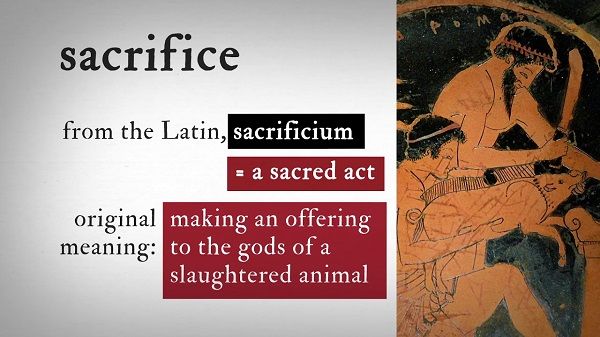
‘Sacrifice’ becomes ugly when used in the wrong way

By Pierre Maré.
I was once a master of four letter words. I learnt my basic rude vocabulary from little friends at playschool, and expanded it in schoolyards to the point where it became ‘copulating’ punctuation. In my twenties, I refined my usage of the insult, learning how to use politely honeyed and apparently civil words as blades or blunt weapons, but I never completely abandoned the short expletive.
According to an article posted on Maledicta, Reinholdt Aman’s wonderful website devoted to all that is verbally insulting, biological, blasphemous and rude, the four-letter word is a form of stress relief: – the ruder the word, the greater the relief.
For instance, in times of yore, someone who dropped a hammer on his foot might utter the words ‘dadgum it’, a euphemism for a common blasphemy. Everyone would go completely silent and a couple of old ladies would choke on their milky tea. Today that just won’t work. Step into a tool shed, take of your shoes and drop a hammer on your left foot. Using remarkable restrain, utter the words ‘dadgum it’! Now drop the same hammer on your right foot and allow yourself a bit of freedom. Do you see what I mean?
I don’t have to perform this experiment to know what I am talking about. After my daughter was born I put aside much of my useful vocabulary, at least while in her presence. ‘Fiddlesticks’ is not remotely as satisfying as another, shorter word that begins with ‘f’.
All the thought and discipline that I have put into the meaning of words and circumventing expletives have lead me to a conclusion that although the four letter word is not something to which you want to expose your child, there are far uglier concepts which hide within even the most virtuous words.
If you are a sensitive reader, perhaps now is the time to stop reading as I am about to expand upon and utter one of the most horrifying and utterly impolite words of all time.
The first time I learned the word was when my mother read the story of Abraham and Isaac to me. Four is not a good age to introduce contentious issues to children, especially when they are intent on rapidly expanding their minds. Opinions formed at that age tend to stick. The idea that God ultimately said stop, didn’t register. The outrage and horror of a father preparing to kill his child stuck.
I was reintroduced to the word at school. It carried the context of giving far more in return for a very notional reward. The teachers touted it as a form of virtue, but the virtue always escaped me, especially against the usually subconscious backdrop of the image of Abraham holding the knife over his son, Isaac. And to this day, I still hear the word almost always used in the fraught emotional context of giving in a way that is unfair and hurts.
My dictionary states that the fifth sense of the word ‘sacrifice’ is to lose by giving something at less than its value. However the first sense of the word is a surrender of something of value to receive something more desirable, or to prevent evil. Although the fifth sense seems more commonly used than the first, the word is actually an economic term, even when used altruistically or in the most emotional circumstances.
‘Sacrifice’ becomes ugly when used in the wrong way. It is filled with pain when spoken by someone to describe his or her circumstances. What that person gives outweighs the perceived benefits. Something in the situation needs to be corrected: a sense of slavery for a start.
It becomes far more ugly when used by a teacher with a vision limited to the short horizons of the playground, classroom and ranks of uniforms. One can almost hear the General bellow, “Charge over the lip of that trench, my boy. It’s good for all of us so it must be good for you!”
As sure as God made little apples, my daughter will return from school one day with the troublesome concept in her head. I will explain the idea of ‘sacrifice’ to her rationally. I will also have an authoritative synonym to help her finally understand. It will be four letters long.












































